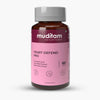What Foods to Avoid with Diabetes
Last updated on:
Diabetes can be a little confusing at times, and food becomes a big issue. What should you eat? What must you avoid? A small mistake can spike your blood sugar. That's why it becomes even more important to know which foods might be harmful to you and which foods can support your health.
This blog will tell you the foods you must stay away from when you are diagnosed with diabetes. It will also give you valuable tips on how to go about healthy options.
1. Avoid Sugary Beverages
Soda, energy drinks, sweetened fruit juices, and flavored forms of milk are heavily loaded with sugar. Sugar from these drinks enters the bloodstream practically instantaneously and spikes blood sugar.
Better Option:
Plain water, coconut water, and buttermilk are highly preferable. Also, Karela Jamun Juice helps keep blood sugar levels in check according to the ancient Indian medical science. Although it does not really taste sweet, it helps to restore some balance inside.
2. Say No to White Bread, Pasta, and White Rice
Those are refined carbohydrates. These carbohydrates have an interesting relationship with blood sugar. Their taste bud tickling notwithstanding, they act just as sugar would in your body. If these nutrients were in a perfect world, they would digest quickly, thereby giving rise to an increased blood sugar level. So, if taken often, they add to the complexities of controlling diabetes.
Better Option:
Choose whole grains like brown rice, oats, millet, and whole wheat bread. These take longer to digest, which keeps your sugar levels more stable.
3. Avoid Packaged Snacks and Baked Goods
Items like biscuits, cookies, cakes, and chips may seem like small treats, but they often contain hidden sugars and unhealthy fats. These snacks offer very little nutrition and can increase both your sugar levels and your weight.
Better Option:
Go for healthy homemade snacks like roasted chana, murmura, or a handful of nuts. You can also include Ayurvedic sugar control supplements in your daily routine to support your body naturally.
4. Stay Away from Fried Foods
Deep-fried foods like samosas, pakoras, and fries are high in calories and bad fats. These not only affect your sugar levels but also increase your risk of heart problems, which is already a concern for people with diabetes.
Better Option:
Try baking or air-frying your snacks. Steamed or grilled food is also lighter and easier for your body to digest.
5. Limit Full-Fat Dairy Products
Milk, cream, cheese, and paneer made from full-fat milk can increase insulin resistance. While dairy is not harmful in small amounts, taking it in excess, especially when it’s full-fat, can make blood sugar harder to control.
Better Option:
Use toned milk or low-fat curd in moderation. Choose natural, unprocessed options whenever possible.
6. Watch Out for Artificial Sweeteners
Many diabetic-friendly foods contain artificial sweeteners. While they are sugar-free, they can still confuse your body, increase cravings, and may even harm gut health in the long run.
Better Option:
Use natural sweeteners like stevia or eat small portions of naturally sweet fruits like papaya or apple. Ayurveda also encourages mindful eating and herbs that help reduce sugar cravings over time.
7. Avoid Alcohol and Processed Meats
Alcohol affects the liver and can lead to sudden drops or spikes in blood sugar. Processed meats like sausages, ham, and salami contain high levels of salt and fat. Both of these can increase your risk of complications from diabetes.
Better Option:
If you consume alcohol, limit it and always eat with it. Choose fresh meat or plant-based proteins like lentils and sprouts for regular meals.
Also Read: How Does a Heart Attack Feel Like
8. Cut Down on Sweets and Indian Desserts
Gulab jamun, barfi, halwa, and laddoos are full of sugar and ghee. Even if you eat them in small amounts, they can cause sugar spikes and affect your long-term health.
Better Option:
Make sweets at home using jaggery, dates, or natural substitutes. Even then, portion control is important. When supported with Ayurvedic medicines for diabetes, these occasional treats become less harmful.
9. Be Careful with High-Sugar Fruits
Fruits are healthy, but not all fruits are safe in large amounts for people with diabetes. Bananas, mangoes, grapes, and lychees are high in sugar and can raise blood glucose quickly.
Better Option:
Go for fruits like guava, apple, berries, or papaya in small portions. Always eat fruits whole, not as juice, so you get the fiber too.
10. Avoid Too Much Salt
This may not be directly related to sugar, but high salt intake increases blood pressure, which can worsen diabetic complications. Many packaged and canned foods contain hidden salt.
Better Option:
Cook fresh at home and use herbs like turmeric, coriander, and fenugreek to enhance taste naturally.
How Ayurveda Helps in Diabetes
Ayurveda views diabetes as a disorder caused by an imbalance in digestion and metabolism. It doesn’t just treat symptoms but works on the root cause.
Ayurvedic remedies focus on:
- Purifying the body
- Strengthening digestion (Agni)
- Supporting the pancreas
- Regulating sugar with natural herbs like Karela, Jamun, Giloy, and Methi
One of the most trusted and easy-to-use remedies is Karela Jamun Juice. It helps improve insulin sensitivity, reduces sugar absorption, and supports better digestion.
You can also take Ayurvedic tablets for sugar control, made with traditional ingredients, to support your sugar management without side effects.
Simple Daily Routine for Diabetes
Here’s a small routine that can help:
-
Morning:
- Warm water on an empty stomach
- 20 ml of Karela Jamun Juice with water
- Light walk or yoga
-
Breakfast:
- Oats, poha with veggies, or moong dal chilla
-
Midday:
- Herbal tea or buttermilk
- Take Ayurvedic diabetes tablets after meals
-
Evening:
- Short walk, light snack like roasted nuts or sprouts
-
Dinner:
- Khichdi, dal with veggies, or soup
-
Before Bed:
- Warm water or herbal decoction
This routine, along with food awareness and natural Ayurvedic support, can help you manage diabetes better every day.
Conclusion
Diabetes may seem challenging, but with the right knowledge and small daily changes, it becomes easier to handle. Avoid foods that are sugary, heavy, and processed. Choose foods that nourish your body slowly and naturally.
Stay active, stay positive, and give your body the support it needs through mindful eating and Ayurvedic care. Every small step counts.
You May Also Like:













